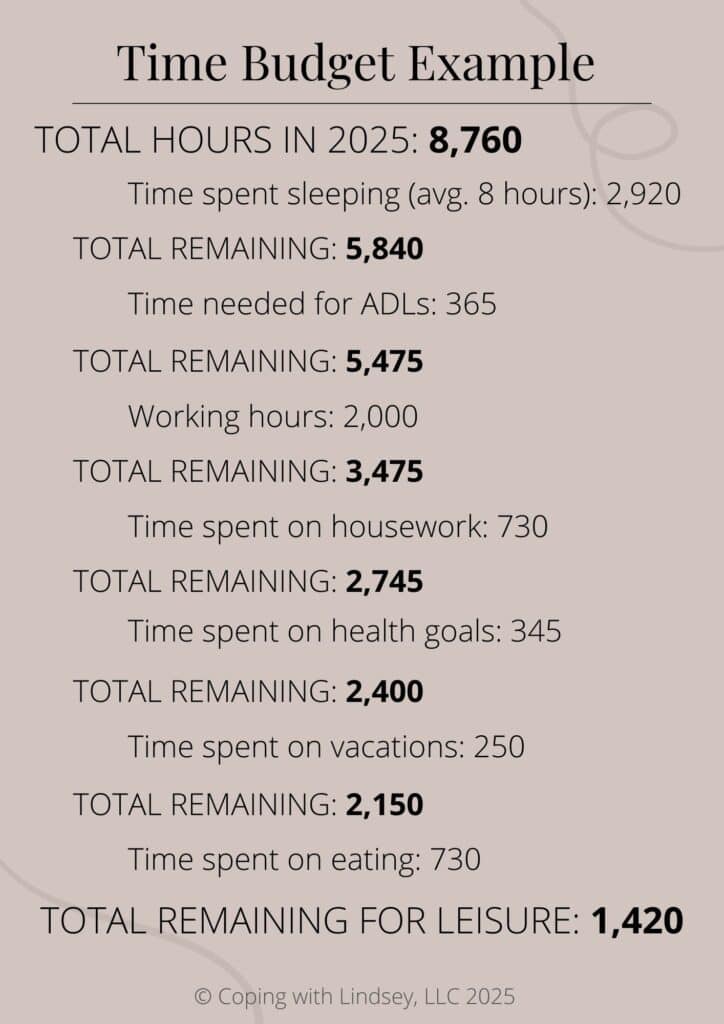How to Make a Time Budget: 3 Simple Steps (2025)
There is no question that money is important. It’s so important that I have built an entire business around how to manage your money as a means to take care of yourself.
But the truth is, at the core of this whole thing, I don’t really care about the numbers. After all, numbers don’t give purpose and meaning to life…
What I really care about is what the numbers can do for you.
Because at the end of the day, there are people making $80,000 a year living a perfectly satisfied life while others are making $280,000 a year and don’t feel an ounce of fulfillment.
I would argue that the unfulfilled person making that $280,000 is unhappy because they’re not spending their money or their time in alignment with their priorities.
I preach all day every day about intentional spending and living for today while saving for tomorrow. And I will always and forever die on that hill. But let’s not forget the other currency that is just as – if not more – important than money: TIME.
You can listen to Financial Self-Care with Financial Therapist, Lindsey on Apple Podcasts, Spotify, or wherever you like to listen!
It’s hard to be happy when most of your time is spent doing things you hate. And that is why today we’re talking about time budgeting.
Time budgeting is exactly what it sounds like: managing your life’s energy in a way that aligns with your priorities and values.
Just like a budget is traditionally used as a way to manage your money, a time budget is a way to plan how you want to spend your time.
Now, in my humble opinion, many people get budgeting wrong. That’s why I have created my Intentional Spending Planner that I use with all my clients and is available on Etsy – also linked in the show notes.
Instead of getting bogged down in the day-to-day spending, the Intentional Spending Planner helps you project out for the month ahead. You make a plan for your money. You are telling your money what to do.
That’s what I want you to do with your time as well.
And just like we reverse engineer your money, we are going to reverse engineer your time. Don’t worry, I’m going to give you examples of exactly how to do this. But first I want to explain why a time budget can work so well for you.
Why You NEED a Time Budget
Time budgeting is sometimes used synonymously for time blocking. But that’s only part of the definition. If you don’t know, time blocking is a way for people to block out their daily calendar. You might see something like:
9:00am – 12:00pm: Administrative work
12:00pm – 1:00pm: Lunch
1:00pm – 5:00pm: Client time
That’s a super basic example, but that’s the general idea of time blocking.
And, like I said, that’s certainly a part of time budgeting, but it falls short of the entire picture.
Time budgeting is a mixture of creating goals, setting intentions, aligning your priorities, vision planning, and calendar-keeping.
It gives you a moment to think about how you want to live your life, both in the day-to-day and also more broadly.
Time Budget: The Mundane Wednesday
I was once introduced to the concept of the “Mundane Wednesday” put forth by Tim Urban, then discussed by Katie Gatti-Tassin of Money with Katie.
The Mundane Wednesday is this idea that we live our lives so tethered to grandiose experiences – oftentimes one-time or once-a-year experiences – like your wedding day, vacations, birthdays, Christmas morning – but most of your life is lived in the mundane; your “Mundane Wednesday.”
And we need to spend more time enjoying the mundane than “nexting” or looking ahead to the next big celebration.
The average life expectancy of a woman in the United States is 80-years-old – that’s roughly 700,000 hours of life on this planet.
Assuming we sleep for roughly a third of that, you will have approximately 467,000 waking hours in your lifetime.
Your wedding day only accounts for 16 hours of that, yet we place so much emphasis on it.
Your birthday will account for 1,280 waking hours of those 467,000 in your lifetime.
Assuming you go on one (1) week long vacation every year for 80 years, that’s 9,000 hours of your waking life spent on vacation time.
Now you might be thinking, “Well, I also work 8 hours a day, 5 days a week.” And you’re right. Assuming you work 40-hour weeks for 50 weeks of the year, from age 22 to 62 – so 40-years – you will have spent 80,000 waking hours at work. But working is part of the mundane. Working isn’t extraordinary. It isn’t glamorous. It’s usually part of the daily lived experience.
Look, I could make this an entire podcast episode and maybe I will, but I want you to see the biggest picture here. And that is from ages 20 – 80, so 60 years, you have 350,000 waking hours and very few of them will be spent on remarkable things.
So the question is: How do you want to budget your time to increase the baseline level of your happiness in the extraordinary and the mundane.
Well, let’s talk about how you can make a time budget for 2025 using three simple steps.
How to Make a Time Budget: 3 Simple Steps
These are three simple steps for making your own time budget:
1. Write your priorities
You need to just braindump all the people, places, and things you’re prioritizing in 2025.
Admittedly, the big stuff – vacations, date nights with your partner, brunch with your girlfriends, spa days for yourself, birthday parties, whatever – is the easiest time to budget for.
So write down the big things you’re prioritizing.
Some of the big things we’re prioritizing this year are:
- 3 day girl’s trip in January
- A concert in May
- 5 day family vacation in June
- 8 day extended family vacation in August
- Family photos in the fall
- A 3-day conference in the fall
- 40+ hunting days for my husband
- Monthly meals with my girlfriends
Then you can move into the smaller stuff like:
- Working out 4 days a week
- Having a relaxing commute to work
- Limiting time on social media
- Reading as a part of your nightly routine
- Having a money date every Saturday morning
Be honest about your priorities. As a mom, it’s likely you find yourself prioritizing your kids, but please remember that you need to be a priority, too.
2. Designate time needed
Once you have your priorities written out, you can designate how much time each thing requires.
So, looking back at that list I just read off, it would look like this:
- Working out 4 days a week for one hour
- Having a relaxing commute to work
- Requires 20 minutes of closing the kitchen, prepping lunches, and house clean-up each night
- Limiting time on social media to 1-hour per day
- Reading for 20 minutes as a part of your nightly routine
- Having a 30-minute money date every Saturday morning
3. Make the budget
Plan out your calendar. Put the important things on your calendar for the year. If it’s not on your calendar, it’s not a priority.
I often tell my clients: Show me your calendar and I’ll show you your priorities. If you tell me monthly date nights with your partner is a priority, but it never lands on the calendar, how much are you really prioritizing your relationship?
Time Budgeting: Common Mistakes
There are some common mistakes I see when people are making a time budget.
1. Ditch perfectionism
I’m not asking you to have every minute of every day planned out. That would be unrealistic and unreasonable. But I am telling you to make a general idea of what you want to see for yourself in your life.
If managing money well is a priority for you, then you must have a money date on the calendar. If movement is a priority for you, then you need to prioritize that by blocking time on the calendar. Same goes for your friendships, intimate relationships, time for yourself, time with your kids, or anything else that you value.
2. Keep it realistic
One of the most common places people spend their time is on social media, 2 hours and 24 minutes each day, according to a study from the University of Maine.
Another study broke the stats down even further and those between the ages of 18-24 spend over three hours per day on social media, those 65 and older are closer to an hour and 45 minutes.
Either way, as a collective we are spending a shit ton of time on our phones, social media in particular.
If, while you’re making your time budget, you decide you want to spend less time on the doom scroll, then I’m all for it.
But I would keep it realistic. On your phone, go into your settings, and see how much time you’re spending on social media. If you’re hovering around the two-hour mark, it’s unlikely you’re going to sustainably change that habit to only 20 minutes a day.
Instead, start slowly decreasing the amount of time you’re spending on your phone each day.
Other common vises I see people spending a lot of time on is watching tv, gaming, and online shopping. Again, none of these are bad, and I’m not going to shame you for have a little R&R. But I want to bring attention to how you want to be spending your time. Be intentional about it.
3. Leave room for rest
And that brings me to the final common mistake I see.
So many people forget that rest is one of the few things in life that is inherently deserved. You do not need to earn rest.
And I encourage you to budget time for rest.
That might include getting 8 hours of sleep or napping or doom scrolling or reading or meditating or whatever you like to do to recharge and recalibrate.
Time Budget: Example
Especially since we’re at the very beginning of 2025, I want to give you an annual example of what a time budget might look like for you:

First, zoom out and take a look at your entire year. In 2025, you have 8,760 hours.
How much time do you want to spend sleeping? If your goal is to sleep 8 hours every night, then you’ll be spending 2,920 hours getting some shut eye – leaving 5,840 waking hours to work with.
Let’s give you some wiggle room for incorporating your nightly and morning routine, averaging an hour each day for those things you’ll have 5,475 hours to work with.
Of those 5,475 waking hours, I’m going to assume you work the average 2,000 of them.
You now have 3,475 waking hours to play with.
We know most women spend at least 2-hours per day on housework, so there goes another 730 hours. That leaves us roughly 2,745.
Let’s assume you made a goal of improving your health this year. You want to go to the gym 5 days per week, for an hour each time and meal-prep healthy meals and grocery shop weekly. All of these tasks are going to take up about 345 hours this year.
We now have 2,400 hours to work with.
You want to take a week long vacation with your family, a long weekend away with you hubby, and have a long weekend away with the kids. Just accounting for waking hours, that’ll be another 250 hours of vacation time.
So we have 2,150 hours left.
We can’t forget about eating – that’s an important thing to do. If you’re like my husband and me, you eat way too fast. Though, one of my health resolutions is to eat slower and more intentionally. So I’m going to be generous and say eating takes 2 hours of the day, another 730 hours.
Now we have $1,420 waking hours available.
Because you’re here, I know you’re spending 30 minutes each week on financial self-care (AKA using your Intentional Spending Planner to track your money).
Which leaves us with about 1,240 waking hours of life to live. That’s just under 3-and-a-half hours a day.
We’ve covered all the main areas of life: Sleeping, working, eating, movement, and money.
Now you get to decide how you want to spend those other hours.
After doing this activity I realized how ridiculous it is that I often don’t feel like there are enough hours in the day. We actually have a lot of hours. We just choose to spend them on things that don’t raise the happiness bar.
Because remember at this point in your time budget you have 3.4 hours a day to work with. But social media takes up 2.2 of those hours.
I don’t know if I’ve ever heard someone mutter the words, I’m so much happier when I spend beaucoups of time on social media.
I swear this isn’t all a ruse to get you to spend less time on your phone, but many of my roads do lead to that conclusion.
The Wrap Up: Time Budget
As I said at the very beginning of all this, I’m interested in your self-care, both financially and otherwise.
While I want you to take inventory of how you’re spending your money, I want you to take time tracking your time as well.
Are you doing things that are bringing you joy, peace, and contentment? Or are you burning the candle at both ends so quickly that your light has gone out?
It’s time you start budgeting your time to live a life you love rather than placating to the norms of society. My hope is that you spend 2025 doing things you love with people you love in places you love.
I hope this episode was helpful and gave you a little insight on how you want to spend your time and your money. If so, send it to a friend! Thank you so much for reading!
Now go enjoy the rest of your day!
Next read: Can Money Buy Happiness?

